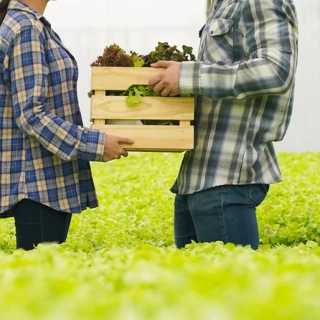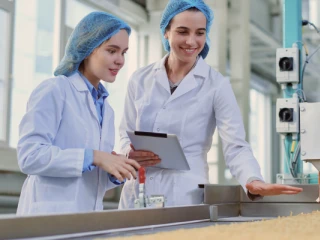Food companies like yours face many challenges in the coming decades – and these are the ones we know about! By investing right now in the right ERP tech you will be well placed to be part of the food supply solution, whatever the future has in store.
So, what does our future larder look like? How strong is your stomach?!
Different sources of food requiring new ways of being supplied
Food producers worldwide face the same conundrum: how to feed more people more sustainably? One answer is by looking at new potential sources of food - the answer may bug you out...
In Disney’s ‘The Lion King’, young Simba is taught the nutritional qualities of grubs and creepy crawlies as an alternative to meat. As it turns out, that’s no fairy tale: rich in protein and minerals, locusts, grasshoppers, crickets and mealworms make great ingredients for a 21st century menu. In some cultures, they’ve been devouring them for centuries.
Insect farming produces far lower levels of greenhouse gases than livestock: insects and grubs require less food, water, land, and energy to raise, and they generate lower environmental pollutants (such as pesticides).
With every new food source comes new challenges – particularly in mass production and transportation as Royal Mail [in the UK] discovered when live wood ants, a key item on the taster menu of Noma’s 2012 pop-up restaurant, were delivered in less than appetising condition…
“Alas, poor skirret!” Rediscovering “lost” ingredients…
Currently, only 30 species account for more than 95% per cent of our food needs. Most experts urge greater diversification over the next few decades.
So prepare your palette to adopt new sources of nutrition – and rediscover ingredients which have long fallen from favour.
Introducing versatile groundnuts, which can be eaten by themselves or milled into flour and used for bread, baking, sauces, and much more. In the UK, menus are likely to become more Shakespearean as we remind ourselves of the culinary qualities of skirret, chamomile, colewart and the marvellously named rouncefall…
Waste not, want not
Leading food companies like yours will need to find ways to ensure as little food as possible is wasted throughout your supply chain.
According to the UN Food and Agriculture Organisation, we waste a third of the food produced. Thankfully, this is changing as public opinion becomes more aware of the issue and increasing food prices force consumers to behave more economically. In developed nations such as the UK, over 50% is wasted at the household level.
In developing countries, studies show that inefficiencies in the supply chain - poor logistics and transport infrastructure - account for most waste.
Impact of climate change
Food insecurity is increasing as water and suitable land become more scarce. Soil erosion and extreme weather events (both well documented results of global heating) mean increased yield losses. Add to this the pressures on host countries of every increasing numbers of refugees as changing weather forces people to flee their homes.
The changing climate is hugely impacting where certain crops can now be found, (both positively and negatively. In addition, overreliance on certain varieties of specific crops (eg bananas and coffee) has left them vulnerable. Disease is threatening to wipe out our most popular species of banana, threatening dire poverty on the regions reliant upon their trade.
Food producers have many strategies in your toolkit to sustainably produce and distribute food to ever-growing numbers of hungry mouths. These include restoring diversity into food systems, improving resilience and developing crops to enhance stress tolerance.
Food fraud
Food fraud was a serious issue prior to the pandemic but, since 2020, there has been a marked rise as shoppers were desperate for supplies and retailers were under significant strain to put products on shelves. Adulteration (when food products fail legal standards) is up by a third globally and, according to the Food Authenticity Network, counterfeiting has risen by 47%.
Solutions that will improve traceability and transparency of food supply chains include smart packaging, robust track and trace and blockchain technology. By implementing solutions now, you will cement your brand as one consumer and your commercial partners are sure they can trust.
“Please sir, I want some more!”
Whatever the future holds, an ERP solution will help you maintain the most manageable and affordable process so you can adapt and evolve faster, better growing your business to succeed – and beat your competition.
Find out how we will help boost your food or beverage business. Discover FAST Food, an ERP-packaged solution Delaware have developed for ambitious mid-market food and beverage companies like yours looking for a state-of-the-art platform for growth.
Alternatively, contact us to discuss your unique challenges and explore our commercial and innovative solutions.
Delaware’s approach
Our experience, insight and expertise helping businesses like yours implement and derive optimal business value from ERP systems will provide you with effective solutions to the challenges and pain points you are facing right now – and in future.
We have never walked away from a project and will get involved at any stage. We invest in building and nurturing strong organisational, professional and personal bonds - enjoying long term relationships with many of our clients.


/Alpro-720-x-360-1-(1).webp?mode=autocrop&w=320&h=240&attachmenthistoryguid=d4af10fa-f2bf-40e8-800d-f03aa5c960dd&v=&focusX=410&focusY=196&c=f210a59735e7174bef767e013d54020d88491be59edf51236d3b6e5205c2a36c)


